Meet Our Students
Michael Oblich (2024)
Majoring in the Neuroscience Concentration of Biochemistry with a Minor in Compassionate Care in Medicine
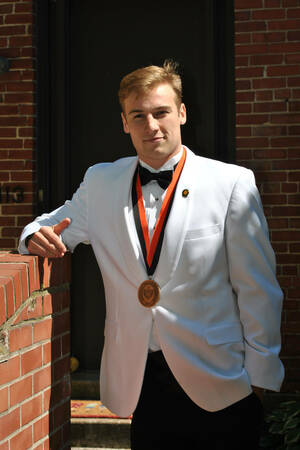
I came in as a Neuroscience & Behavior major, but after my first two semesters of chemistry at Notre Dame, I had a slight change of heart. I had great experiences with the chemistry faculty and they helped foster within me a strong passion to go deeper and learn more in the field, despite its difficulty. The idea of using chemical principles to gain a better understanding of biological processes was (and still is) very appealing to me as someone hoping to pursue a career in medicine. The overlap of the biochemistry major with the Neuroscience concentration and Compassionate Care in Medicine minor, as well as the excellent preparation for medical school, solidified my choice to switch into the major.
After graduation, I plan to continue on to medical school, hopefully eventually specializing in Orthopedic Surgery, Anesthesiology, or Neurology. Outside the classroom, I serve on the executive board of the Compassionate Care in Medicine Club and am a member of the Pre-Professional Society. Whether it be hosting speakers from different fields of medicine, providing engaging service opportunities, or just sponsoring study breaks, both of these clubs greatly contributed to my personal and professional development. I like to stay active in my dorm community as well, serving as academic commissioner and playing on the intramural tackle football team for Knott Hall. I find that participating in activities like these help to foster greater friendships and provide a nice counterbalance to sometimes stressful academic workloads.
Feel free to contact me (moblich@nd.edu). I am happy to answer any questions you might have!
Daniel Gatewood (2024)
Majoring in Biochemistry with a Minor in Bioengineering
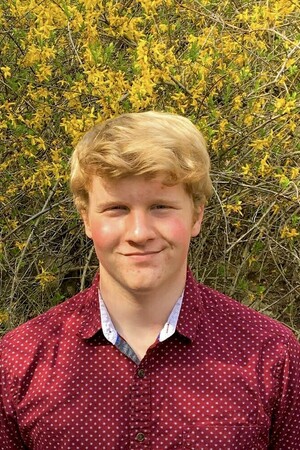
I was attracted to Biochemistry after loving my science classes in high school and enjoying a biochemistry research project through a lab in my hometown before my senior year. Any biological system at the tissue scale or smaller is really interesting, so the biochemistry major felt right for me. I'm excited to begin my studies for my Bioengineering minor this fall. At first I thought I wanted to go to medical school, but now I think that graduate school is more attractive to me. I am considering a PhD in biochemistry, molecular biology, or biomolecular engineering, but I'm also thinking about going to law school for Patent law. At Notre Dame, I'm a member of the Notre Dame Glee Club and the secretary of the Notre Dame Undertones A Cappella group. I tutor freshman chemistry, serve as a Teaching Assistant for the intro biology laboratory, and conduct undergraduate research in the Clark lab studying protein folding.
Recent Graduates
Audrey Miles (2023)
Double major in Chemistry with Computing and Theology
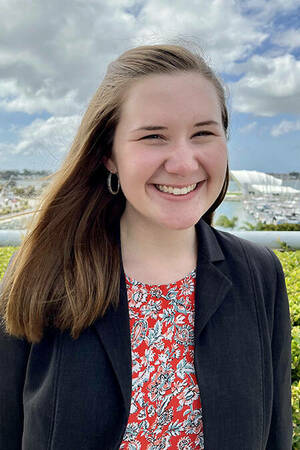
Next Step: Pursuing M.S. in nuclear energy at the University of Cambridge as a Churchill Scholar ('23-'24); then Ph.D. in chemistry at the University of California Irvine as a National Science Foundation Graduate Research Fellow
I have always been curious about the world around me, and I love to learn. Though I was initially unsure how I could narrow my interests to choose a single career path, my high school coursework quickly made it clear that I needed to study chemistry. Precise but still creative, chemistry reveals the beautiful complexity of the world and works to understand those complexities through problem solving. In choosing a college, I was looking for a rigorous science program that still allowed for flexibility in exploring my other interests. Though I was certain that I wanted to study chemistry, I still loved so many other disciplines. Where successful applications to other elite universities seemed to require that students present themselves as having streamlined interests in a single subject, Notre Dame was one of the few schools that welcomed the desire to pursue many passions and learn for learning’s sake. The chemistry program itself is designed to encourage this kind of exploration. As a Chemistry with Computing major, courses intended for Computer Science students are built into my program of study. This combination program is incredibly flexible, allowing me to discover a love for programming and a potential interest in pursuing a career as a computational chemist. In addition to this combination program, I have been able to explore a wide variety of potential second majors - everything from physics to French, and math to environmental engineering. Ultimately, I fell in love with theology. At Notre Dame, I have the unique opportunity to both learn about the minute mechanics of the processes that govern our world and ask the big questions about why those details matter. On any given day, I may spend my morning writing a code that models a chemical process, and my afternoon talking about love and grace and beauty and truth. Studying a hard science like chemistry allows me to answer questions like “how” and “what,” and theology reminds me that the “why?” is just as important.
Outside of my coursework, I conduct undergraduate research as a member of Prof. Amy Hixon’s actinide chemistry research group. My work investigates the chemistry of uranyl peroxide nanoclusters, which have envisioned applications in fuel generation, advanced separations, and nuclear waste management. Previously, I conducted computational research with Prof. William Schneider involving first-principles free energy calculations and kinetic modeling of reaction mechanisms. I have also loved working as a teaching assistant for the general chemistry labs. Outside of the lab, I am the treasurer for the Notre Dame Figure Skating Club, play piano for my residence hall, and am a member of the Glynn Family Honors Program. I am grateful that Notre Dame is a place where I can grow in faith, friendship, and scholarship as part of an incredibly caring community. After graduating from Notre Dame, I hope to pursue a doctorate in nuclear science or physical chemistry, conduct research seeking cleaner energy, and teach at the university level.
Theresa Heidenreich (2023)
Major in Biochemistry with a Minor in Anthropology
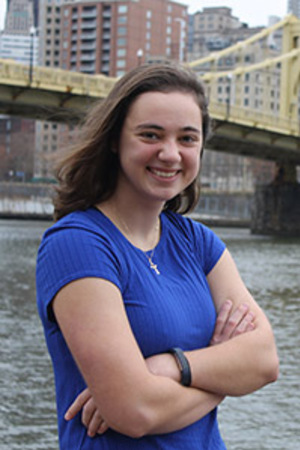
Next Step: Pursuing Ph.D. in biomedical sciences at the University of Pittsburg
I've always been fascinated by science, learning, and problem solving, and biochemistry has been the perfect intersection of the three. I love to learn about how things work in the world around me, especially about biological systems at the molecular level. Studying biochemistry at Notre Dame has allowed me to develop critical thinking and problem solving skills in both the classroom and the undergraduate research lab. I especially enjoyed the opportunity to pursue research using CRISPR technology to study vision in A. aegypti through the Molecular Cell Biology Research Special Studies Course with Dr. Michelle Whaley. I am also involved in undergraduate research studying antimicrobial and antifungal peptides in the Lee Lab. After graduation, I hope to go to graduate school for genetics or biomedical sciences to prepare for a career as a researcher and teaching professor. Teaching is a strong passion of mine, and I am excited by the opportunity to share my love of science with others as a teaching professor. Outside the classroom, I am a violinist in the Notre Dame Folk Choir, which is a liturgical choir that provides music ministry for Sunday Mass in the Basilica of the Sacred Heart and music outreach to the Notre Dame community. I also play the violin in the Notre Dame Symphony Orchestra and for Sunday Mass in my dorm, Lewis Hall. I've enjoyed participating in my dorm community, especially as the commissioner for Lewis Hall's Lucernarium, which is a candle-light night prayer service with music and liturgy. I love to play intramural sports of all kinds, run the lakes, and play volleyball and basketball with friends.
Jenna Kautzky (2023)
Major in Chemistry
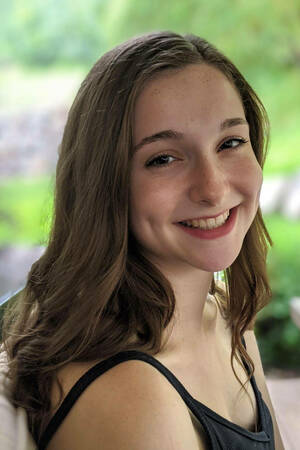
Next Step: Gap year working as a medical scribe, with intent to begin medical school in fall 2024
I graduated from high school knowing I wanted to study an area of STEM which could be used for a future medical degree, but what attracted me to the chemistry major at Notre Dame were the countless opportunities to become involved with undergraduate research and put classroom topics into practice. I also felt as though pursuing a degree in chemistry would allow for many potential career paths in the future. After graduation, I hope to study medicine and practice in rural or otherwise underserved areas. Currently, I am quite interested in practicing anesthesiology while pursuing research relevant to this career path. While at Notre Dame, I have been involved with the University of Notre Dame Chorale. The Chorale is Notre Dame’s sole concert choir, and I find that it allows me to be involved with a supportive community and devote my time to something not related to science. I also partake in undergraduate research as a member of the Ashfeld Group. Currently, I am working on two projects. The first pertains to the synthesis of natural product n-heterocyclic molecules. The second is focused around synthesis of small molecule inhibitors of DYRK1A protein-protein interactions, which have been linked to disorders such as Alzheimer’s Disease and Down Syndrome.
David Haungs (2023)
Major in Chemistry and Political Science
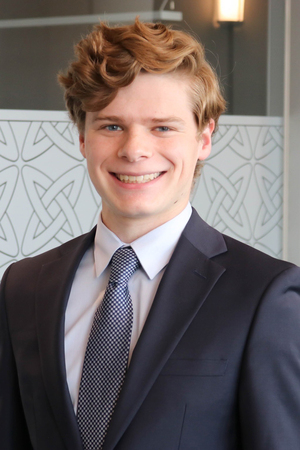
Next Step: Pursuing J.D. at Yale Law School
I was attracted to chemistry by the discipline's use of rigorous mathematical and scientific methods to investigate natural phenomena. Chemistry has produced incredible practical advances for society, which likewise attracts me to the field, but just as important for me is the search for a deeper understanding of the world in its own right. This focus of Notre Dame as a whole, which promises as part of its mission statement "the pursuit and sharing of truth for its own sake," is an indelible part of the University's Catholic and intellectual character which drew me to study here. Additionally, the focus on teaching chemistry and biochemistry majors through great professors in small, specifically designated class sections - even for intro classes - is one I have appreciated. Finally, the availability of research for undergraduates is unmatched. I gained my first research experience in my very first year simply by asking a professor to join his lab, where I still work today.
During my time at Notre Dame, I am working towards a career goal of practicing patent law, particularly pertaining to inventions in the chemical industry. For this reason, in addition to my chemistry classes and research, I am also majoring in political science, as some of my activities on campus reflect. I conduct research in the lab of Dr. Seth Brown, investigating the synthesis of theoretically significant transition metal complexes and the mechanisms behind their formation. As part of this project, with support from the Flatley Center for Undergraduate Scholarly Engagement (CUSE), I conducted research full time over the Winter Session in 2021, and soon plan to seek publication of the results of my work thus far. This research opportunity became available to me as part of another activity I am involved in, CUSE's Sorin Scholars program. Additionally, over the summer of 2021, I am continuing my chemistry research in the chemical industry, where I will work for the Lubrizol Corporation of Berkshire Hathaway, performing organic synthesis to graft antioxidants to hydrocarbon membranes to improve the durability of fuel cells in which they are used. At school, I also serve as Judicial Council President, overseeing the judicial branch of the Student Union by administering elections, hearing cases of misconduct, providing support to students accused of OCS violations, and enacting constitutional reform. I also serve as an editor of Beyond Politics, the University's undergraduate political science journal. Finally, in the 2021-2022 academic year, I am an Undergraduate Research Fellow for the Notre Dame Institute for Advanced Study, where I intend to study the legal and economic ramifications of judicial decisions relating to patent law alongside an expert Faculty Fellow.